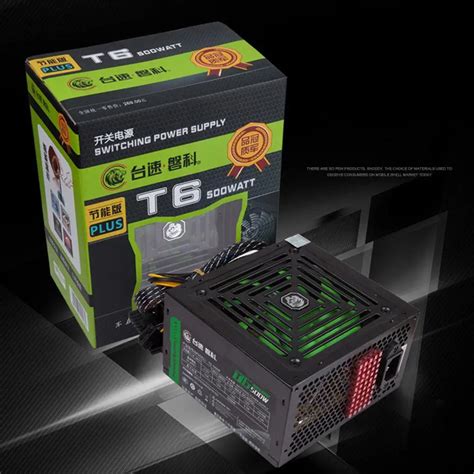The pursuit of energy efficiency in computer systems has led to significant advancements in power supply technology. As the world becomes increasingly conscious of energy consumption and its environmental impact, the development of energy-saving power supply units (PSUs) for PCs has become a critical focus area. These units are designed to provide stable power to the computer's components while minimizing energy waste. In this context, understanding the factors that contribute to an energy-saving PSU and how they benefit both the user and the environment is essential.
Traditional power supplies have often been criticized for their inefficiency, converting a significant portion of the input power into heat rather than usable electricity. This not only increases energy bills but also generates unnecessary heat, which can reduce the lifespan of computer components. In contrast, energy-saving PSUs are engineered to achieve high efficiency ratings, typically measured by the 80 PLUS certification program. This program certifies PSUs based on their efficiency at 20%, 50%, and 100% loads, with levels ranging from 80 PLUS Bronze to Titanium, each representing a higher efficiency threshold.
Key Points
- Energy-saving PSUs are designed to minimize energy waste and reduce heat generation.
- The 80 PLUS certification program is a key benchmark for measuring PSU efficiency.
- High-efficiency PSUs can lead to significant savings in energy costs over time.
- Modular cabling in energy-saving PSUs helps reduce clutter and improve airflow within the computer case.
- Ecological benefits of energy-efficient PSUs include reduced carbon footprint and less electronic waste.
Technological Advancements in Energy-Saving PSUs

Several technological advancements have contributed to the development of more efficient PSUs. One of the key innovations is the use of high-quality components, such as capacitors and transformers, which are designed to operate at higher efficiencies and have longer lifespans. Additionally, the implementation of advanced circuit designs, such as synchronous rectification and active power factor correction, has significantly improved the efficiency of PSUs across a wide range of loads.
Modular Design and Cable Management
Another significant feature of modern energy-saving PSUs is their modular design. This design allows users to only connect the cables that are necessary for their system, reducing clutter and improving airflow within the computer case. Improved airflow not only helps in reducing dust accumulation but also aids in cooling the components, which can lead to increased system reliability and lifespan. Modular designs also make it easier for users to upgrade their systems, as new components can be added without the need for additional cables.
| Efficiency Level | 80 PLUS Certification | Efficiency at 20%/50%/100% Load |
|---|---|---|
| Basic | 80 PLUS Bronze | 82%/85%/82% |
| Mid-range | 80 PLUS Gold | 90%/92%/90% |
| High-end | 80 PLUS Platinum | 92%/94%/90% |
| Premium | 80 PLUS Titanium | 94%/96%/94% |

Environmental Impact and Cost Savings

Beyond the technological and performance aspects, energy-saving PSUs have significant environmental and economic benefits. By reducing energy consumption, these PSUs contribute to lower greenhouse gas emissions, helping to mitigate climate change. Additionally, the reduced heat output and increased reliability of components can lead to less electronic waste, as systems and their components last longer. From an economic standpoint, the energy savings can accumulate over time, leading to lower electricity bills for consumers and businesses alike.
Future Developments and Challenges
As technology continues to evolve, we can expect even more efficient PSUs to be developed. The challenge for manufacturers will be to balance efficiency with cost, ensuring that these energy-saving solutions are accessible to a wide range of consumers. Furthermore, the integration of renewable energy sources and the development of more sustainable manufacturing processes will play critical roles in the future of PSU technology.
What is the 80 PLUS certification, and how does it relate to PSU efficiency?
+The 80 PLUS certification is a standard for measuring the efficiency of power supplies. It ensures that PSUs meet certain efficiency standards at various load levels, helping consumers identify and choose energy-efficient products.
How can I determine the appropriate wattage for my PC's power supply?
+To determine the appropriate wattage, calculate the total power draw of your system's components, including the CPU, GPU, RAM, and storage devices. Online wattage calculators can provide a more precise estimate based on your specific hardware configuration.
What are the benefits of a modular PSU design?
+A modular PSU design offers several benefits, including reduced cable clutter, improved airflow within the case, easier system upgrades, and potentially better aesthetics due to the cleaner internal appearance of the PC.
In conclusion, energy-saving power supply units for PCs represent a crucial step towards more sustainable computing. By understanding the technologies, benefits, and selection criteria for these PSUs, consumers can make informed decisions that not only enhance their computing experiences but also contribute to a more environmentally friendly future. As the world continues to rely heavily on digital technologies, the importance of energy efficiency in computer hardware will only continue to grow, driving innovation and adoption of energy-saving solutions like efficient PSUs.


